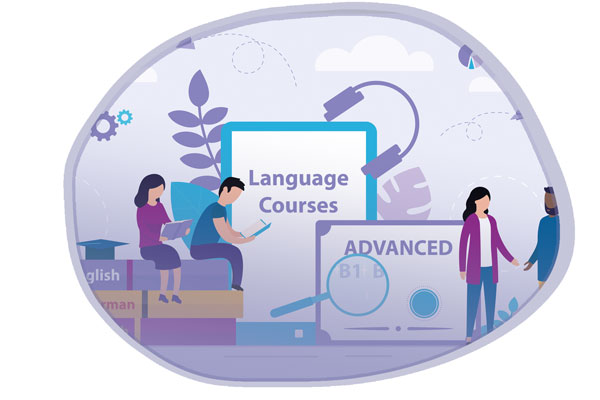Knowledge of foreign languages and, above all, knowledge of the national language of the country in which people live and work in is fundamental to professional success and social integration in society. Due to the problem that language learning is very time and cost intensive, new ways of teaching language skills are needed.
The digitalization of recent years has created opportunities to teach even complex content in online tools and courses. In order to be able to use these efficiently in language teaching, teachers in this field also need the corresponding skills.

The goals of this project are to:
1. increase competences on digital language education
2. encourage the use of digital learning and assessment tools by language teachers
3. develop a European wide knowledge base of digital competences connected to personal and social competences
4. ensure the employability and further development of language educators in a digitalized world
5. support the monitoring of competences for individuals as well as for education providers
With these project results, the competence area of digital language education and the use of digital tools for language teachers will be promoted. Furthermore, language schools should develop an awareness of the benefits of using online communication technologies with their students and a Europe-wide knowledge base of digital literacy combined with personal and social skills should be achieved. In addition, this is intended to ensure language learning independent of time and costs.
Background
Language is seen as the gateway to the world, as an instrument for better mutual understanding, exchange and as a basis for communicating and living common values and views. However, knowledge of the language of the respective country of residence is also the basis for survival in the job market.
Europe is confronted with immense challenges – many languages are available in a geographically very small area, which makes mutual exchange, the growing together of the individual countries and the transfer of knowledge and labor mobility more difficult. In addition to these challenges, Europe was and is confronted with a large number of asylum seekers who – as soon as the status of asylum or subsidiary protection is final – must be integrated into the labor market as quickly as possible in order to become full and valuable members of the host country. Efforts in this direction are essential, on the one hand, in order not to overstretch the national budgets of the member states financially and, on the other hand, to strengthen the perception of the migrant population as valuable members of society and to maintain social peace.
However, language learning is time and cost intensive and requires an incredible amount of resources. New ways of teaching language skills are therefore needed at this point. The digitalization of recent years has created opportunities to teach even complex content in online tools and courses. In order to be able to use these efficiently in language teaching, teachers in this field also need the corresponding skills. With regard to this, the “Fit4DigiLinE” project aims at ensuring that language teachers have these required skills.

xx



